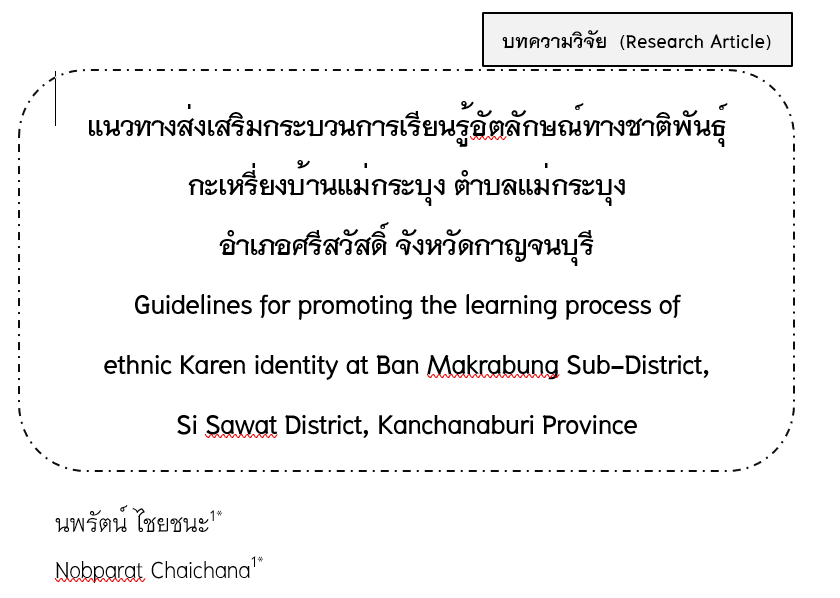Guidelines for Promoting the Learning Process of Ethnic Karen Identity at Ban Makrabung Sub-District, Si Sawat District, Kanchanaburi Province
Keywords:
Karen Pwo Ethnic Group, Ethnic Identity, Learning ProcessAbstract
The objectives of this research were to study 1) community context and ethnic Karen identity 2) synthesize ethnic identity learning process and 3) to propose a guideline to promote learning process of Karen ethnic identity in Ban Makrabung Sub-District, Si Sawat District, Kanchanaburi Province Use a qualitative research methodology. applied research methods in anthropology in-depth interview The key informants were the abbot of Wat Ton Maphrao, the village headman, the village headman's assistant. and 14 Pwo Karen ethnic groups. The secondary informants consisted of 4 government agencies in the area and 2 representatives of youth in the community. Specific sampling was used. Study Area, Village No. 2, Ban Makrabung Sub-District, Si Sawat District, Kanchanaburi Province.
The results of the research revealed that Ban Makrabung is one of 6 communities in the administrative area of the Makrabung Sub-District Administrative Organization. The characteristics of the mountains that stretch along the way of the district resemble a large basket. became the name of the community and subsequent districts, respectively Most of the population is ethnic Karen Pwo people who migrated from Thong Pha Phum District for over 100 years. satisfied with what they have At present, ethnic identities representing Karen ethnic groups are 1) settlement and residence identities, 2) occupation and livelihood identities, 3) traditions, rituals, and belief identities. 4) Dress identity 5) Food identity 6) Performance identity (Ramthong) and 7) Language identity. Regarding the learning process of ethnic identity, the learning process takes place to do, to live, to inherit through relationships in different dimensions, learning to live in harmony with nature and the resources available in the community. including learning to adapt in each era to maintain ethnic identity The guidelines for promoting the learning process of Karen ethnic identity in Ban Makrabung include: (1) government agencies; Promote and support in building pride through community activities and emphasizing participation and working together as a network member (2) Ethnic groups must create awareness at the family level. and give importance to various activities held in the community as well as establishing a community learning center to be a source of community knowledge. (3) Schools in the community should create local curricula to integrate with school teaching management and create pride for youth.
References
ขวัญชีวัน บัวแดง Alexander Horstmann และ สมัคร์ กอเซ็ม. (2556). พื้นที่ทางศาสนาและการปรับสร้างอัตลักษณ์ของผู้ย้ายถิ่น. กรุงเทพฯ: สำนักงานกองทุนสนับสนุนการวิจัย.
ขวัญชีวัน บัวแดง. (2546). ศาสนาและอัตลักษณ์ของกลุ่มชาติพันธุ์ : ศึกษากรณีกลุ่มชนกระเหรี่ยงในประเทศไทยและประเทศพม่า. เชียงใหม่: สถาบันวิจัยสังคม มหาวิทยาลัยเชียงใหม่.
ขวัญชีวัน บัวแดง. (2546). ศาสนาและอัตลักษณ์ของกลุ่มชาติพันธุ์: กรณีศึกษาชนกะเหรี่ยงในประเทศไทยและประเทศพม่า. กรุงเทพฯ: สำนักงานกองทุนสนับสนุนการวิจัย.
คณะกรรมการเศรษฐกิจและสังคมแห่งชาติ, สำนักงาน. (2564). ร่างแผนพัฒนาเศรษฐกิจและสังคมแห่งชาติ ฉบับที่ 13 (พ.ศ. 2566 – 2570). กรุงเทพฯ: สำนักงานสภาการพัฒนาเศรษฐกิจและสังคมแห่งชาติ.
นพรัตน์ ไชยชนะ และ วีระวัฒน์ อุดมทรัพย์ (2559). ลือกาเวาะ: วิถีการทํามาหากินกะเหรี่ยงโผล่วบ้านไร่ป้า ตําบลห้วยเขย่ง อําเภอทองผาภูมิ จังหวัดกาญจนบุรี. วารสารมนุษยศาสตร์และสังคมศาสตร์ มหาวิทยาลัยทักษิณ, 11(2), 119–140.
นพรัตน์ ไชยชนะ อภิชาติ ใจอารีย์ และ ประสงค์ ตันพิชัย. (2564). กระบวนการเรียนรู้อัตลักษณ์ทางชาติพันธุ์มอญ: กรณีศึกษาบ้านวังกะ ตำบลหนองลู อำเภอสังขละบุรี จังหวัดกาญจนบุรี. วารสารมนุษยศาสตร์และสังคมศาสตร์ มหาวิทยาลัยพะเยา, 9(1), 256–278.
นพรัตน์ ไชยชนะ. (2561). แนวทางการเสริมสร้างศักยภาพชุมชนด้านความมั่นคงทางอาหารของกลุ่มชาติพันธุ์กะเหรี่ยงโปร์บ้านทิพุเย ตำบลชะแล อำเภอทองผาภูมิ จังหวัดกาญจนบุรี. กาญจนบุรี: สถาบันวิจัยและพัฒนา มหาวิทยาลัยราชภัฏกาญจนบุรี.
นพรัตน์ ไชยชนะ. (2562). อัตลักษณ์ทางชาติพันธุ์มอญจากรุ่นสู่รุ่น: กรณีศึกษาบ้านวังกะ ตำบลหนองลู อำเภอสังขละบุรี จังหวัดกาญจนบุรี.
(วิทยานิพนธ์ปรัชญาดุษฏีบัณฑิต สาขาวิชาการพัฒนาทรัพยากรมนุษย์และชุมชน). กรุงเทพฯ:มหาวิทยาลัยเกษตรศาสตร์.
นายว้ากอ (นามสมมติ) (สัมภาษณ์), 12 กันยายน 2564, นพรัตน์ ไชยชนะ (ผู้สัมภาษณ์).
บัณฑิต ไกรวิจิตร. (2559). การเผชิญกับภาพแทนของกะเหรี่ยงโผล่วในเขตรักษาพันธุ์สัตว์ป่าทุ่งใหญ่นเรศวร. (วิทยานิพนธ์ปรัชญาดุษฏีบัณฑิต สาขาวิชาสหวิทยาการ). กรุงเทพฯ: มหาวิทยาลัยธรรมศาสตร์.
ประคอง จุลสอน. (2557). รูปแบบกระบวนการเรียนรู้อัตลักษณ์ชุมชน ผ่านเครือญาติญ้อ ตำบลคลองขาม อำเภอยางตลาด จังหวัดกาฬสินธุ์. (วิทยานิพนธ์ปรัชญาดุษฎีบัณฑิต สาขาวิชานวัตกรรมเพื่อการพัฒนาท้องถิ่น). มหาสารคาม:มหาวิทยาลัยราชภัฏมหาสารคาม.
พิมุข ชาญธนะวัฒน์. (2548). ชื่อชุมชนนี้มีความหมาย. วารสารภาษาและวัฒนธรรม, 24(1), 46–59.
มนตรี ศรีราชเลา. (2561). การเปลี่ยนแปลงการตั้งชื่อหมู่บ้านและอัตลักษณ์ท้องถิ่นที่สะท้อนผ่านชื่อหมู่บ้านในจังหวัดมหาสารคาม. วารสารศิลปกรรมศาสตร์ มหาวิทยาลัยขอนแก่น, 10(2), 112–123.
ศรีศักร วัลลิโภดม. (2551). ความหมายของภูมิวัฒนธรรม การศึกษาจากภายในและสำนึกของท้องถิ่น. กรุงเทพฯ: มูลนิธิเล็ก-ประไพวิริยะพันธ์.
สมเกียรติ สัจจารักษ์. (2554). แนวทางการส่งเสริมการเรียนรู้เพื่อรักษาอัตลักษณ์ชาวเลมอแกน. (วิทยานิพนธ์ปรัชญาดุษฎีบัณฑิต สาขาวิชาการศึกษาตลอดชีวิตและการพัฒนามนุษย์). กรุงเทพฯ: มหาวิทยาลัยศิลปากร.
สมทรง บุรุษพัฒน์, สุจริตลักษณ์ ดีผดุง, สุมิตรา สุรรัตน์เดชา, ปัทมา พัฒนพงษ์, ณรงค์ อาจ สมิติ และ พิเชฐ สีตะพงษ์. (2554). การใช้ภาษา ทัศนคติต่อภาษาและการท่องเที่ยวเชิง ชาติพันธุ์ของกลุ่มชาติพันธุ์ในภูมิภาคตะวันตกของประเทศไทย. กรุงเทพฯ: บริษัทสร้างสื่อ.
สมศรี ศิริขวัญ. (2541). การวิเคราะห์เชิงนิเวศวิทยาวัฒนธรรมเกี่ยวกับการตั้งถิ่นฐานของมนุษย์: กรณีศึกษาชุมชนมอญเกาะเกร็ด จังหวัดนนทบุรี. (วิทยานิพนธ์สังคมศาสตรมหาบัณฑิต สาขาสิ่งแวดล้อม). กรุงเทพฯ: มหาวิทยาลัยมหิดล.
สนธิ เขียวเหลือง (สัมภาษณ์), 12 กันยายน 2564, นพรัตน์ ไชยชนะ (ผู้สัมภาษณ์).
องค์การบริหารส่วนตำบลแม่กระบุง. (2560). แผนพัฒนาท้องถิ่น (พ.ศ.2561 – 2565). กาญจนบุรี: งานวิเคราะห์นโยบายและแผน สำนักปลัดองค์การบริหารส่วนตำบลแม่กระบุง.
Chaichana, N., (2018). Modes of Production and Food Security in a Cultural Dimension: A Case Study of Pwo Karen Community in Ban Thiphuye, Chalae Sub-district, Thong Pha Phum District, Kanchanaburi Province, Thailand. Asian Political Science Review, 2(2), 24–32.

Downloads
Published
How to Cite
Issue
Section
License
Copyright (c) 2022 Phayao University

This work is licensed under a Creative Commons Attribution-NonCommercial-NoDerivatives 4.0 International License.
ผู้นิพนธ์ต้องรับผิดชอบข้อความในบทนิพนธ์ของตน มหาวิทยาลัยพะเยาไม่จำเป็นต้องเห็นด้วยกับบทความที่ตีพิมพ์เสมอไป ผู้สนใจสามารถคัดลอก และนำไปใช้ได้ แต่จะต้องขออนุมัติเจ้าของ และได้รับการอนุมัติเป็นลายลักษณ์อักษรก่อน พร้อมกับมีการอ้างอิงและกล่าวคำขอบคุณให้ถูกต้องด้วย
The authors are themselves responsible for their contents. Signed articles may not always reflect the opinion of University of Phayao. The articles can be reproduced and reprinted, provided that permission is given by the authors and acknowledgement must be given.







